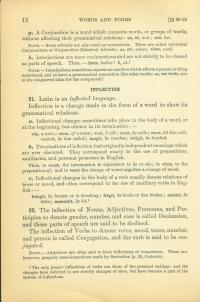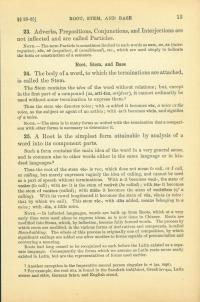21. Latin is an inflected language.
Inflection is a change made in the form of a word to show its grammatical relations.
a. Inflectional changes sometimes take place in the body of a word, or at the beginning, but oftener in its termination.
vōx a voice
vōcis of a voice
Vocō. I call.
Vocat. He calls.
Vocet. Let him call.
Vocāvit. He has called.
Tangit. He touches.
Tetigit. He touched.
b. Terminations of inflection originally had independent meanings which are now obscured. They correspond nearly to the use of prepositions, auxiliaries, and personal pronouns in English. Thus, in vocat, the termination is equivalent to he or she; in vōcis, to the preposition of; and in vocet the change of vowel signifies a change of mood.
c. Inflectional changes in the body of a verb usually denote relations of tense or mood, and often correspond to the use of auxiliary verbs in English.
Frangit. He breaks. (is breaking)
Frēgit. He broke. (has broken)
Mordet. He bites.
Momordit. He bit.1
22. The inflection of Nouns, Adjectives, Pronouns, and Participles to denote gender, number, and case is called Declension, and these parts of speech are said to be declined.
The inflection of Verbs to denote voice, mood, tense, number, and person is called Conjugation, and the verb is said to be conjugated.
Note— Adjectives are often said to have inflections of comparison. These are, however, properly stem-formations made by derivation (§ 124, footnote).
23. Adverbs, Prepositions, Conjunctions, and Interjections are not inflected and are called Particles.
Note— The term Particle is sometimes limited to such words as num, -ne, an (interrogative), nōn, nē (negative), sī (conditional), etc., which are used simply to indicate the form or construction of a sentence.


